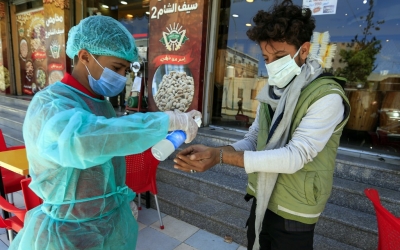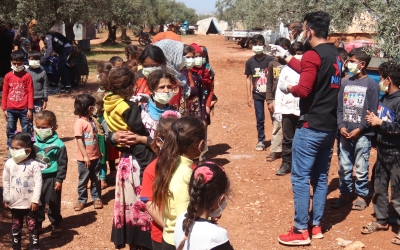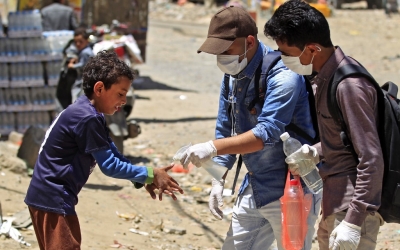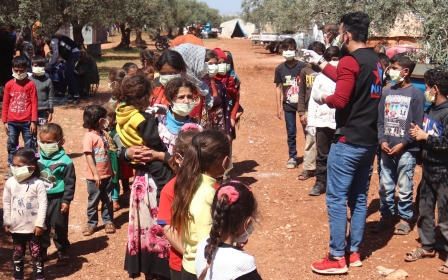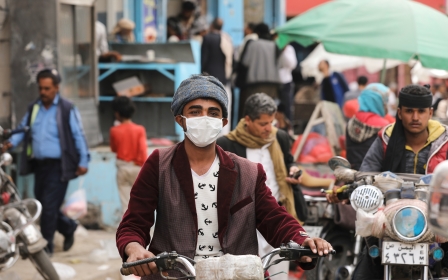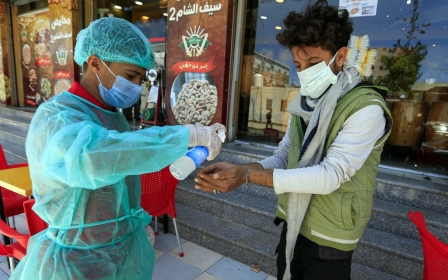Coronavirus succeeds in freeing Yemeni prisoners of war where politics failed
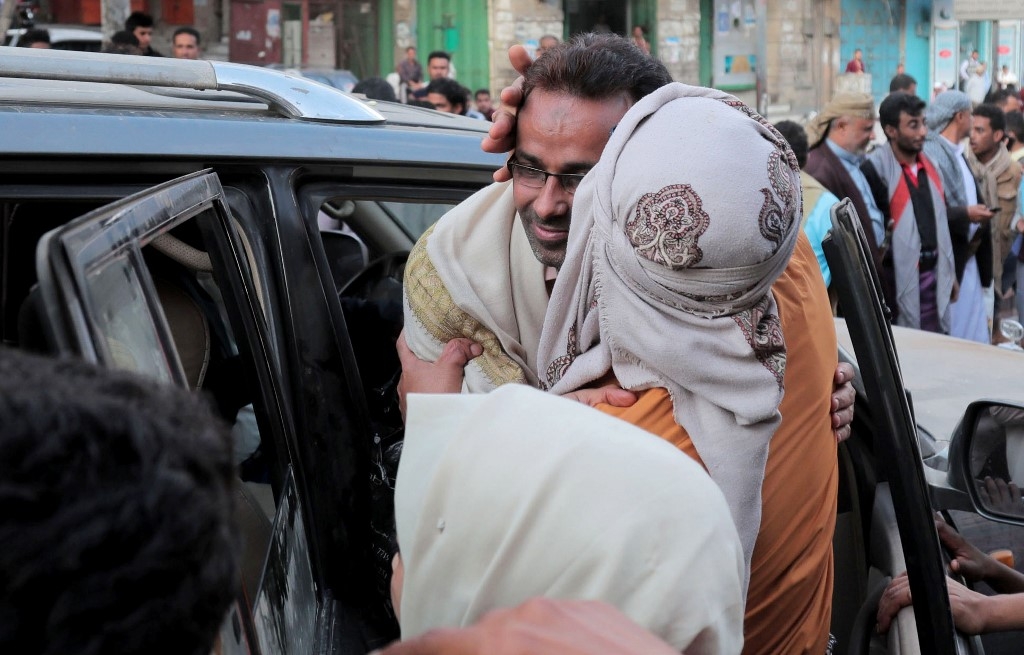
For months, Yemen's warring parties have struggled to agree to an exchange of prisoners, which many see as a crucial step towards peace. This month, coronavirus succeeded where negotiations failed, as rivals freed detainees in an attempt to suppress any potential outbreaks.
The United Nations has urged the Yemeni government and its Houthi enemy to cease hostilities during the pandemic, and a nationwide ceasefire is reportedly close to being agreed upon, with the country recording its first Covid-19 case last week.
A group of UN experts has warned that prisoners in Yemen are particularly vulnerable in the event of an outbreak of the highly contagious virus, as the country's overcrowded prison facilities have "appalling" conditions and Yemen's health system has nearly collapsed after five years of war.
On 2 April, the internationally recognised government, which is backed by a Saudi-led coalition, released more than 470 prisoners, and nearly a week later the Houthi movement, which controls vast areas of the south and the capital Sanaa, followed suit.
Judge Nabil Nasser al-Azzani, attorney-general of the Houthi administration, said on Sunday that a total of 2,361 prisoners had been released since 15 March, in the context of precautionary measures to confront the coronavirus, according to the Houthi-run Saba News Agency.
New MEE newsletter: Jerusalem Dispatch
Sign up to get the latest insights and analysis on Israel-Palestine, alongside Turkey Unpacked and other MEE newsletters
The criteria for release included having served three-quarters of a sentence and good conduct, he added.
One of the released prisoners, Abdullatif, is a former mercenary soldier, recruited by the Saudi-led coalition to fight against the Houthis around two years ago.
The father of one, who is in his late 40s, spoke to Middle East Eye from his home in Taiz, where he lives with his mother, wife and child.
Since his arrest in August, Abdullatif had been hoping political agreements would lead to his release. Only the coronavirus, however, had fulfilled his wish to be free.
“I could never imagine that I would be released because of the coronavirus. All negotiations and agreements failed to release me, but the virus did,” he said.
March marked the fifth anniversary of the conflict, which started when Saudi Arabia and its regional allies started a bombing campaign to restore the government of President Abd Rabbuh Mansour Hadi, who had been toppled by the Houthis.
Saudi Arabia accuses the Houthis of being an Iranian proxy, but the rebel group portrays itself as the legitimate government in Yemen.
The violence quickly turned the already impoverished country into the worst humanitarian crisis in the world, according to the United Nations.
List of vulnerable prisoners
The exchange of war prisoners has taken centre stage in negotiations between the warring parties in Yemen since the the UN-brokered Stockholm agreement in December 2018.
The agreement had three main components, one of which was an executive mechanism on activating the prisoner exchange agreement.
Some prisoners have been released as part of the agreement since November, though not nearly in the numbers that both sides desire.
“We heard some news inside prison that the Stockholm agreement would lead to our release in January 2020, but that didn’t happen because I was arrested in the battlefield,” Abdullatif told MEE.
When rumours began circulating that a new wave of prisoners would be released due to coronavirus, he assumed he wouldn't be among them, despite his diabetes making him one of the most vulnerable.
“To my surprise, the prison administrators included my name among those who are at risk,” he said.
Abdullatif thought that only those who are perceived to show “good conduct” would be released, regardless of their health condition.
“Only after one week, I was released with many others who are mostly above 40 years old or suffer from various diseases,” he added.
A source in the Houthi-led Supreme Political Council told MEE that the decision to release prisoners was made by a committee formed by the attorney-general to judge who should be released.
“We should take all precautionary measures against the coronavirus, but not all prisoners should be released. Only the attorney-general and the committee can decide who deserves to be set free.”
Fighting for money
Abdullatif says he lost his job as an assistant carpenter when the war in Yemen broke out in 2015. Failing to earn money to support his family, he opted for joining the Saudi-led coalition as a mercenary fighter.
“When the war broke out, I did not find any work and was living with my wife, child and mother in the same house in a rural area in the outskirts of Taiz,” he said.
'It is only thanks to the coronavirus that our family is reunited'
- Mother of a released mercenary fighter
After three years of financial struggle, he decided to join the battles on the Saudi border.
“I admitted to the Houthis from the first day that I joined for the sake of money,” he told MEE.
“It was the only choice for me to join the battles with the Saudis because they pay a lot,” he said, adding that he was recruited along with dozens of young people from his village.
“I was the eldest among them. We joined the battles in July 2018 and fought the Houthis until August 2019, when they arrested thousands of pro-Saudi fighters, including me.”
When he got arrested, Abdullatif says he was so worried about his family that he asked the Houthis to interview him on their TV channels so his mother could see that he was safe.
“Hundreds were killed on that bloody day, including some of my neighbours,” he said.
“I was interviewed by the Houthis, and I advised the youth not to join battles with Saudis for the sake of money.”
Abdullatif called his mother as soon as he was released and she did not believe he had been freed until he travelled back to Taiz and met her in person.
“I returned to my village and now I am enjoying my life with my family again. This is the best moment in my life and I will not return the battles again.”
Abdullatif’s mother, Sharifah, is in her 70s. She told MEE that her health deteriorated after her son’s detention.
She says she did not approve of his mercenary job, but understood that he was desperate to provide for the family.
“I had lost hope to meet him again, but thank God I am now living again with my child under the same roof,” she said. “It is only thanks to the coronavirus that our family is reunited.”
“I hope that the government stops sending our sons to fight with Saudis,” she added.
Abdullatif echoes his mother’s wish, saying he was disappointed to see that many young men from his village have recently joined the battles for money.
“I would rather stay in my house and eat only bread than join the battles again,” he said.
Middle East Eye delivers independent and unrivalled coverage and analysis of the Middle East, North Africa and beyond. To learn more about republishing this content and the associated fees, please fill out this form. More about MEE can be found here.


